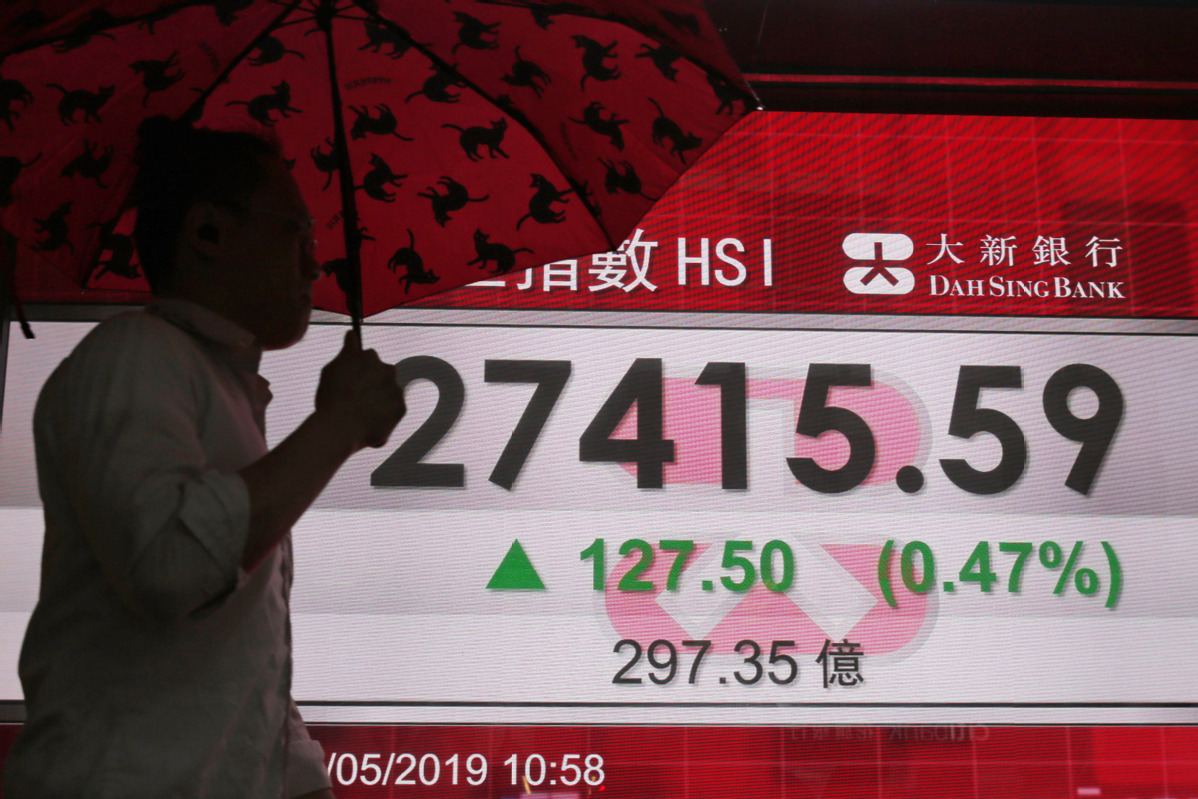Bourses brace for more wild swings


Sudden escalation in global trade disputes take investors, analysts 'by surprise'
Volatility may be turning into the new normal for financial markets.
Global investors may need to consider how to weather intensified market volatility, which could linger due to US-China trade tensions, analysts said.
Recent backward steps in Sino-US trade talks have sparked fear among investors that an all-out trade war will ravage the world's economies. Market volatility surged, with the so-called "fear index" - the Chicago Board Options Exchange's Volatility Index (VIX) - hitting 23.38 on May 9.
The index is used to measure the level of anxiety among traders in financial markets and stood at just under 13 on May 3, the last trading day before the US administration's threat to raise tariffs on Chinese imports.
"After a period of calm negotiations, the Sino-US trade conflict sharply escalated on May 6. This was followed by the US raising the tariff rate on $200 billion worth of Chinese imports from 10 percent to 25 percent on May 10," said Thomas Deng, chief China strategist for Swiss investment bank UBS AG.
"The sudden escalation took us and the market by surprise," Deng said in the report.
The VIX reading has retreated back to 18.36 as of Tuesday's close. But most of the market remains on edge in case of potential jolts in the trade disputes of the world's two biggest economies.
On May 9, China's benchmark Shanghai Composite Index ended at 2851, a fall of over 13 percent from its recent intraday high. The index recovered somewhat by finishing at 2914.7 on Wednesday.
The Dow Jones in New York has swung just as sharply. It was trading near 26,505 on May 3 before the tariff threat, but slid to an intraday low of 25,223 10 days later. The Dow has barely recovered as it closed on Tuesday at 25,347.
Since the beginning of May, Japan's Nikkei 225 has also slumped by 5.64 percent to end at 21,003 on Wednesday, while Europe's FTSE 100 has gone down by 2.01 percent to 7269 on Tuesday.
With fear cresting over trade, safe-haven assets marched in the other direction. From a closing price in New York of $1,271.90/oz late last month, gold climbed in the middle of the market turmoil to settle at $1,302/oz in early May. It was trading on Tuesday at $1,248.
"We maintain the view that the ongoing trade war has had an impact on investor sentiment and disagree with the US government's comments that the US would be unaffected by this escalation," said George Efstathopoulos, a portfolio manager at Fidelity International.
Trade tensions may continue to disrupt global financial markets, making it necessary for global investors to prepare to weather the risks, analysts said.
If the trade stalemate and concerns of global growth prospects linger, world stock markets may face downside pressure, said Lukman Otunuga, a market researcher at FXTM, an international foreign exchange platform.
Gold may be on an uptrend in the mid to long-term as risk appetite is dragged by a slowing world economy, Otunuga wrote in a report.
As UBS's Deng cautiously explained: "How markets move from here will depend on whether trade negotiations bear fruit or come to nothing."
For small investors, the swings are stomach-churning and may not be good for their portfolios. But analysts also see opportunities amid the volatility.
Efstathopoulos said: "The impact of a full-blown trade war is likely to be felt by investors across both sides of the world, but we also see these bouts of volatility as potential buying opportunities."
The Fidelity official said that "despite heightened political and economic uncertainty against a backdrop of deteriorating data and negative revisions to corporate earnings globally, coupled with the recent backward steps in US-China trade negotiations, markets had been posting substantial returns."
"If the trade war between the US and China continues to take center stage, then investors will need to adapt to the uncertainty and increased volatility, as both these traits may be with us for a while yet," he added.
In a word, volatility is here to stay for the markets, like it or not.




































